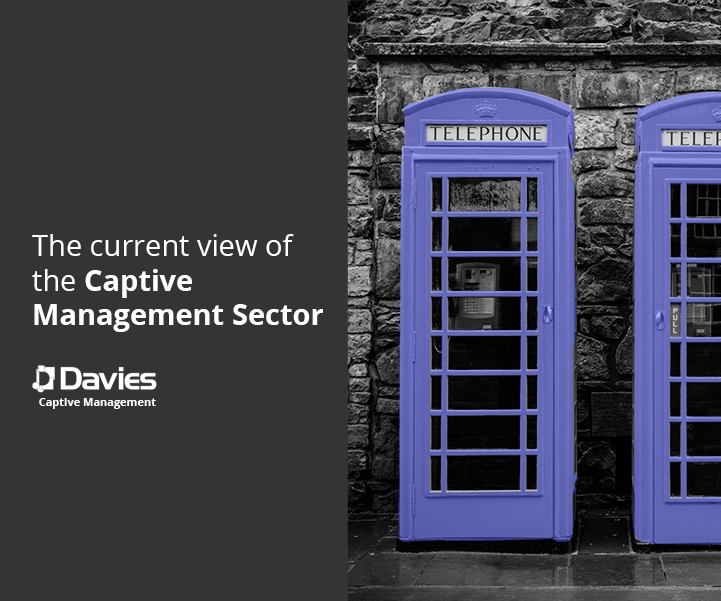Davies discuss the current view of the captive management sector
5th March 2020

This article was first published by Captive Insurance Times
Steven Crabb, Nick Frost and Sam O’Shaughnessy of Davies discuss the current view of the captive insurance sector along with the firm’s plans for 2020
What are the current hot topics in the captive industry?
Steven Crabb: At Davies, we are already tapped into the cannabis risk opportunity; Nick Frost has been to Canada a few times to talk to potential clients there. The price of regular insurance for those businesses is expensive so we are seeing this as a strong opportunity for our captive management solutions business.
Nick Frost: Captives and cannabis risk is an important item in Canada and the US at the moment.
Turning to captives, both reinsurance and fronting are huge topics – more businesses all over the world are turning to captives to help manage their insurance risks and in most cases they need fronts and in all cases, they need reinsurance to limit their maximum exposure. There are a limited number of fronts and reinsurers of captives in the marketplace so the ones that get in first with a good business plan will get the best deals.
Most fronts and reinsurers specialise in different lines so if a business needs a captive it is a good idea to speak to someone like Davies to help navigate and introduce them to the appropriate people to help them achieve their goals.
There was a record attendance at The World Captive Forum this year because the insurance rates are firming for the first time since the 80s and there is a lack of capacity. Many people in the industry do not remember those times. When the market price gets hard, businesses look to captives – Latin American countries, in particular, are increasingly looking towards captive options and US and Canada are finding that capacity for certain lines of business has shrunk and they need a captive to fill in the gaps in coverage.
I have heard horror stories in Canada and the US where companies on renewal are getting 50 to 200 percent rate increases even if their losses are good. These are ideal for a captive.
Crabb: There’s an increased interest in the South American market, such as Columbia and Argentina and how we can help them with captive creations.
Frost: All geographical locations, are seeing their premiums increase even to companies with excellent loss experience. Losses don’t substantiate the rate increases and consequently, they are looking for captives, which is where we specialise and are able to offer our expertise and experience.
What themes are you currently seeing in the captive insurance market?
Crabb: The theme we are thinking of as a group at Davies is how we increase our service offering to become more valuable to our clients. We are domiciled for captives in Bermuda and the US and are assessing where else we should have a platform to continue to respond to our customers better. So that could be Guernsey, Gibraltar or it could be Malta.
We are quite interested in those three areas because there are three different nuances of regulations, which would broaden our capability for UK, European and International customers.
As we enter or already entered a hardening market, how do you expect captives to perform?
Frost: Very well, this is the best market for a captive. With hardening prices captives will inevitably be used to a much greater extent. It has been a long time waiting, and we expect it to grow with the hardening of the market.
What advice would you give to captive owners during a hard market?
Crabb: Captive owners are buying regular insurance and they are buying some insurance from their own captive due to regular insurance becoming more expensive. If in four years’ time, as regular insurance becomes cheaper, people will use captives less and will start to buy normal insurance again. I don’t think that’s going to happen in the near future.
What do you think are the biggest challenges the market is facing?
Frost: I think the biggest challenge is finding insurance/reinsurance for particular lines. A number of Lloyd’s markets have cut back on lines and products that historically used to reinsure people from Canada, Latin America. Even if you have a captive you still have to have reinsurers to reinsure you. They are more likely to reinsure you if you take risks yourself. If you are taking risk, they know you are going to manage it properly; reinsurers would rather offer you their capacity if you have a captive and participate in the risk.
Crabb: There are people offering these reinsurance products now which are specific lines of business, however, there are less of them and it is becoming more expensive.
So do firm’s domicile in Bermuda because of its large insurance market?
Frost: Yes. Bermuda has excellent depth as a reinsurance sector, along with London and New York – no other jurisdiction has reinsurance capacity to the same scale.
And they know captives, so it’s very easy for us to set up a captive and reinsure in the Bermuda market
Sam O’Shaughnessy: Bermuda is seen as a one-stop-shop, you have your reinsurance available together with captive legislation and expertise.
What would you say are the biggest opportunities for the market this year?
Crabb: Non-standard risks, like cannabis, are an opportunity for risk managers to respond properly with the captive idea. This is a big issue for businesses who are involved in the cannabis industry. Not necessarily the people selling it in the shop but the people who transport it, people who finance it, people who work in the supply chain, they find it really tough to find insurance, so we’re hoping to respond and to get them some good insurance products.
What plans does your firm have in place for 2020? And what are you hearing from clients?
Crabb: Our overall group is very focused on the US – we are looking to expand in the US. We want to try and get a situation where we have a full-service group. So anyone involved in the insurance industry, we should be able to provide a full set of services to them.
Frost: From a captive perspective, we will be doing more business in the US and Canada and spending more time building out our Latin America client base.
Crabb: It is a huge focus for us this year, the acquisitions we made last year boosted our presence in the US. We’re looking to build on that this year and get all the services going in the adjacent spaces to captives.
There are other services in risk and consulting that we think we could respond to and help our customers better.
Our Solutions
-
- Article
- Technology
3 Tips to Ensure your Customer Due Diligence Process is Client Friendly
To meet your KYC and AML obligations, you need to carry…
-
- Article
- Consulting
7 crucial steps to getting the most from your employee feedback
This was first published by Servicetick, a Davies company. In previous articles,…
-
- Acquisition
- Article
- Claims Solutions
Acquisition announcement: Davies adds to its specialist motor claims capability with acquisition of GBB Holdings
Davies today announces the acquisition of GBB Holdings incorporating specialist forensic…
-
- Article
- Insurance Services
Ardonagh-owned Towergate partners with ServiceTick
Towergate Insurance has announced a new partnership with ServiceTick – a…



